2010 山东省泰安市中考英语真题及答案
本试卷分第 I 卷(选择题)和第 II 卷(非选择题)两部分。第 I 卷 1 至 8 页,第 II
卷 9 至 11 页,共 120 分。考试时间 120 分钟。
第 I 卷(选择题,共 80 分)
第一部分 听 力(共 25 小题;每小题 1 分,满分 25 分)
(一)听句子,选择适当的应答语。每个句子读两遍。
1. A. It’s new.
2. A. No, I can’t.
3. A. They are good.
B. It’s fine.
B. Yes, I do.
B. Good idea.
C. It’s black.
C. Yes, I am.
C. We like hot dogs.
4. A. He is swimming.
B. I’m reading.
C. She is singing.
5. A. It’s my pleasure.
B. I’m afraid I can’t.
C.
Yes,
please.
(二)听对话及问题,选择相对应的图画。每段对话及问题读两遍。
6.
A.
7.
A.
8.
A.
9.
A.
10.
A.
B.
B.
B.
C.
C.
C.
B.
B.
C.
C.
�
B. In 1965.
(三)听五段对话和五个问题,选择每个问题的正确答案。每段对话及问题读两遍。你将
有 15 秒钟的时间阅读下面 5 个小题。
11. A. In 1953.
12. A. Went to a picnic.
13. A. Every day.
14. A. Country music.
15. A. $ 100.
(四)听两段长对话,选择每个问题的正确答案。每段对话读两遍。你将有 20 秒钟的时间阅
读下面 5 个小题。
听第一段对话,完成第 16—18 小题。
16. Where does the woman go?
B. Did her homework.
B. Sometimes.
B. Pop music.
B. $ 200.
C. In 1955.
C. Had a party.
C. Never.
C. Classical music.
C. $ 300.
A. The hotel.
B. The hospital.
C. The station.
17. Where is the station?
A. At the end of the road.
B. In the middle of the road.
C. Near the
factory.
18. How far is the station?
A. Three kilometers.
B. Two kilometers.
C. Ten kilometers.
听第二段对话,完成第 19、20 小题。
19. What are they getting ready for?
A. Teachers’ Day.
B. Children’s Day.
C. Women’s Day.
20. Where will they hold the party?
A. In the office.
B. In the library.
C.
In
the
classroom.
(五)听短文,选择每个问题的正确答案。短文读两遍。你将有 20 秒钟的时间阅读下面 5
个小题。
21. What does the mother do?
A. A teacher.
B. A farmer.
C. A worker.
22. What is the mother like?
A. She is tall and beautiful.
B. She is tall and fat.
C. Her hair
is brown.
23. What does the mother like doing?
A. Fishing.
B. Swimming.
C.
Planting
flowers.
24. Who does she often give flowers to?
A. Her friends.
B. The teacher.
C. The father.
25. What is important to a student from the passage?
A. Playing.
B. Studying.
C. Surfing the Internet.
第二部分 语言知识运用(共两节, 满分 25 分)
第一节 语法和词汇(共 15 小题;每小题 1 分, 满分 15 分)
从每小题 A、B、C、D 四个选项中, 选出能填入相应空白处的最佳选项, 并在答题卡上将该项涂
黑。
26. —What’s ______ most useful invention in the 20th century?
—______ computer, I think.
B. a, A
A. the, A
27.
—Lucy, do you like ______?
C. the, The
D. /, The
—Yes. Most of my clothes are ______.
A. an orange, an orange
C. oranges, oranges
B. orange, orange
D. orange, an orange
�
28.
—Jim, Tom is looking for his English book. Is this ______?
—No, that is ______. I don’t know where his is.
A. his, mine
C. him, mine
B. he, mine
D. his, my
29.
—Why do you always watch Channel 10 instead of Channel 5, Grandpa?
—The programs on Channel 10 are ______ better.
A. more much
B. much more
C. more
D. much
30. —I can’t decide ______.
—You mean the purple sweater or the blue one?
A. how to go there
B. who to go with
C. where to visit
D.
which
to
choose
31.
—Where is Mr. Lee? I have something important to tell him.
—You ______ find him. He ______ Japan.
A. won’t, has gone to
C. may, has gone to
B. may not, has been to
D. can’t, has been to
32. —Which of these two English books will you borrow?
—I’ll borrow ______ of them. Because they are very interesting.
A. either
C. neither
B. all
D. both
33.
—Lots of trees and flowers ______ on both sides of Huanshan Road last year.
—Oh, that’s beautiful.
A. are planted
B. were planting
C. were planted D. have planted
34. —Hi, Daming. It’s said the famous singer will come to Tai’an. Do you know ______?
—Next month.
A. when does he come
C. when will he come
B. when he comes
D. when he will come
35.
—Tom, your books should be in right order.
—OK. I’ll ______ right now.
A. put them down
B. put them away C. put them up
D. put them on
36. —How about going shopping this weekend, Peter?
—Sorry. I prefer ______ rather than ______.
A. to stay at home, go out
C. staying at home, go out
B. to go out, stay at home
D. going out, stay at home
37. —______ will you come back, Mum?
—In ten minutes.
A. How long
B. How soon
38. —______ kind girl Nancy is!
C. How often
D. How far
—Yes, she is always ready to help others.
A. What
B. What a
C. How
D. How a
39. —Hello! Is that Kate speaking?
—Yes, ______.
A. it’s Kate
B. I’m Kate
C. this is Kate
D. Kate is me
40.
—My mother and I will go to Shanghai this summer.
—______. Shall we go together?
A. So do I
B. So can I
C. So am I
D. So will I
第二节 完形填空(共 10 小题;每小题 1 分, 满分 10 分)
阅读下面短文,掌握其大意,然后从每题所给的 A、B、C、D 四个选项中,选出能填入
�
短文相应空白处的最佳选项,并在答题卡上将该项涂黑。
Stuart and Steve were twin brothers. Stuart loved to play basketball. But Steve
loved to read books.
One day Stuart was playing basketball
he fell and broke his leg. When they
took him to the hospital, the doctor said he wouldn’t be able to play for six months.
him and brought him books on basketball. At first Stuart wasn’t
Steve went
going to read them. Then he began to read them and
that there were ways he could
play basketball better. He began to think that books weren’t that
44 .
41
43
42
When Stuart’s leg started getting better, Steve would help him by going
for walks with him.
Stuart’s doctor said he could start playing basketball
again. Then Stuart showed Steve how to toss (投) for baskets. Steve found that he enjoyed
it.
45
Then Stuart was ready to
46
the basketball games. Steve went to games and
enjoyed himself. They then
47
practiced basketball and read books together.
So you can see, when
48
you can find new things to do.
happens, something good may also happen. Steve showed
Stuart about books and Stuart showed Steve about basketball. So you can also
49
showing others something that you like to do and they can show you something that they
like to do.
41. A. until
42. A. on seeing
43. A. saw
44. A. good
45. A. But
46. A. take part
B. when
B. to call
B. looked
B. bad
C. to visit
C. read
D. So
D. join in
B. However
B. win
C. Finally
C. lose
D. found
D. worse
C. better
50
C. after
D. where
D. to look
47. A. always
B. never
C. seldom
D. much
48. A. anything good
B. something nice
C. something bad D. anything wrong
49. A. try
B. practice
C. enjoy
D. like
50. A. On the way
第三部分 阅读理解(共 20 小题;每小题 1.5 分, 满分 30 分)
C. All the way
B. By the way
D. In this way
阅读下列短文,从每题所给的 A、B、C、D 四个选项中, 选出能回答所提问题或完成所
给句子的最佳选项, 并在答题卡上将该项涂黑。
A
Sixteen years ago a boy gave me an important gift. It was a smile.
It was the early autumn of my first year at a middle school, and my old school
was far away. As a result, no one knew who I was. I was very lonely, and afraid to
speak to anyone.
Every time I heard the other students talking and laughing, I felt my heart break.
I couldn’t talk with anyone about my problems.
Then one day, when my classmates were talking happily with their friends, I was
sitting at my desk unhappily as usual. At that moment, a boy entered the classroom.
I didn’t know who he was. He passed by me and then turned back. He looked at me, with
a smile.
Suddenly, I felt the touch of something bright and friendly. It made me feel happy
and warm. That smile changed my life. I started to talk with other students and made
friends. Day by day, I became closer to everyone in my class. The boy with the lucky
�
smile has become my best friend now.
One day I asked him why he had smiled, but he couldn’t remember doing so!
It doesn’t matter because all the dark days have gone. I believe that the world
is what you think it is. If you think it is lonely, you might always be alone. So smile
at the world and it will smile back.
51. When did the writer get the gift?
A. At the age of 16.
B. After making friends with the boy.
C. In the first year at a middle school.
D. After becoming closer to everyone in the class.
52. Why was the smile an important gift?
A. Because the writer’s old school was far away.
B. Because the writer didn’t know who the boy was.
C. Because the smile didn’t mean anything to the boy.
D. Because the writer felt lonely and had no friends and it made her feel happy
and warm.
53. Why didn’t the writer talk to anyone in her new school about her problems?
A. Because she was always unhappy.
B. Because she didn’t know anyone at the time.
C. Because she was in the first year at the junior high school.
D. Because she didn’t want her parents to worry about her.
54. How did the smile change her life?
A. She started to make friends.
B. She became the best friend of the boy.
C. Her parents didn’t worry about her any more.
D. She realized that she was lonely.
55. Where does she now think her feeling of unhappiness came from?
A. From her old school.
C. From herself.
B. From her parents.
D. From her classmates at the new school.
B
Almost every day, we discuss the topic of health, especially for kids. But what
is health? “Health” means eating well, getting enough exercise, and having a healthy
weight. Let’s read the following rules. They can help you stay healthy.
1. Eat a variety of food, especially fruit and vegetables. We all know that eating
fruit and vegetables can help us stay healthy, but many of us only eat our favorite
food. Remember that we can only get the nutrition (营养) we need by eating different
kinds of food, especially fruit and vegetables.
2. Drink water and milk most often. Everyone knows that water is important. Besides
that, kids need plenty of calcium (钙) to grow strong bones, and milk is rich in it.
Every day, you should drink at least three cups of milk, when you are 9 years old or
older. You should also try to have less sugary drinks, like soda and coca. They include
a lot of sugar. Sugar only includes calories (热量), not important nutrition.
3. Listen to your body. When you are eating, notice how your body feels. When your
stomach feels comfortably full, stop eating. Eating too much makes you feel
�
uncomfortable. If you do it too often, it can make you unhealthy and fat.
4. Limit screen time. What’s screen time? It’s the amount of time you spend watching
TV, movies and playing computer games. The more time you spend on these sitting-down
activities, the less time you spend playing sports, like basketball, and doing other
activities like riding and swimming. Try to spend no more than 2 hours a day on screen
time.
56. In this passage, “health” includes all of the following EXCEPT ______.
A. eating well
B. doing more exercise
C. having a healthy weight
D. wearing comfortable clothes
57. The underlined phrase “a variety of” means ______.
A. plenty of
B. all kinds of
C. the rest of
D. a lot of
58. Which of the following is NOT true?
A. Eating more fruit and vegetables is good for people.
B. We should eat and drink things with little sugar.
C. We should spend the same time on both sitting-down activities and sports.
D. When we are full, we should stop eating, no matter how delicious the food is.
59. Screen time is the time that you spend ______.
A. playing computer games
B. watching movies
C. watching TV
D. All of above
60. What’s the main idea of the passage?
A. How to eat healthy food.
B. Eating and playing are both important.
C. Suggestions for staying healthy.
D. Health is very important.
C
In Britain you may often hear “Drop in any time” or “Come to see me soon”,
but you can’t really do that. People just say those things to make you feel welcome.
It is better to telephone before visiting someone at home. If you receive a written
invitation to an event that says “RSVP”, you should reply to let the person who sent
the invitation know whether or not you plan to go.
You should never accept an invitation unless you really plan to go. You may refuse
by saying, “Thank you for inviting me, but I will not be able to come.” If, after
accepting, you are unable to go, be sure to tell those who are expecting you as soon
as possible that you will not be there. Although it is not necessarily expected that
you give a gift to your host, it is considered polite to do so, especially if you have
been invited for a meal. Flowers, chocolate, or a small gift are all appropriate(合
适的). A thank-you note or telephone call after the visit is also considered polite
and is an appropriate way to express your appreciation for the invitation.
61. What can you do when a British friend says, “Drop in anytime”?
A. Visit him or her at any time.
�
B. Say no time to him or her seriously.
C. Telephone him or her before visiting.
D. Visit him or her soon.
62. What does the underlined word “RSVP” probably mean in Chinese?
A. 请自便
B. 请回复
C. 请审阅
D. 请来访
63. What should you do if your British friend sends you an invitation but you do not
want to go?
A. Do not give him or her an answer.
B. Tell another friend to go instead of you.
C. Tell him or her that you can’t be there for some reason.
D. Tell him or her that you don’t want to go there.
64. Which of the following is considered impolite in Britain?
A. Buy small presents when invited.
B. Refuse the invitation without telling anyone.
C. Write a thank-you note after a visit.
D. Give a telephone call after a visit.
65. Where would you probably see this passage?
A. In an invitation. B. In a guidebook.
C. On a poster.
D.
In
a
newspaper.
D
At the World Expo Shanghai 2010, you will be able to see the world in just one
day.
The World Expo (short for “exposition”) is the third largest world event after
the Olympics and the FIFA World Cup. Countries build pavilions(展示馆) at the Expo,
showing off technologies and cultures with colorful exhibitions and performances.
People can experience the most advanced technologies at the World Expo. Throughout
history, many new inventions have made their debuts(样品) at the World Expo, including
the TV, telephone and even the ice cream cone.
But the Expo is not just a trade fair(商品交易会). It’s a platform(平台) for
cultural exchange, bringing people closer to the rest of the world.
For example, at the Shanghai Expo, couples may be able to marry in French-style
weddings at the France Pavilion. Thailand will let visitors walk into its emperor’
s palace. Visitors to the Austria Pavilion will have the chance to experience the
snow-capped mountains of the country.
Many countries have also decided to bring their national treasures to the event.
Since the 1993 Expo in Chicago, the World Expo began to focus on one theme. It
changed from a show into a community event. Visitors are invited to help solve global
�
issues, such as environmental problems.
The theme of the Shanghai Expo is “Better city, better life”. It will call on
the world to solve the problems human beings face as a result of urbanization(城市
化). In the future, more and more people may care about protecting the places they
live in.
66. Countries build pavilions to show us ______ with colorful exhibitions and
performances.
A. the Olympic games
B. the FIFA World Cup
C. technologies and cultures
D. many cities
67. What’s the meaning of “cultural exchange” in this passage?
A. 科技展示
B. 文化交流
C. 科技交流
D. 自由买卖
68. Which of the following is NOT true at the World Expo in this passage?
A. People can experience the most advanced technologies.
B. Couples may be able to marry in French-style weddings at the France Pavilion.
C. Visitors can walk into the emperor’s palace of Thailand.
D. Australia Pavilion will let the visitors experience the snow-capped mountains
of the country.
69. When did the World Expo begin to focus on one theme?
A. In 1990.
B. In 1993.
C. In 1998.
D. In 2010.
70. What is the theme of the Shanghai Expo?
A. One world, one dream.
B. Better world, better life.
C. Better city, better life.
D. One world, one family.
绝密★启用前
试卷类型:A
泰安市二〇一〇年初中学生学业考试
英 语 试 题
第 II 卷(非选择题 共 40 分)
注意事项:
1. 答卷前将密封线内的项目和答题纸上的座号填写清楚。
2. 在试题上、草稿纸上答题无效,答案必须写在答题纸的相应位置。
3. 考试结束后,试题和答题纸一并收回。
第四部分 书面表达(共三节,满分 40 分)
�
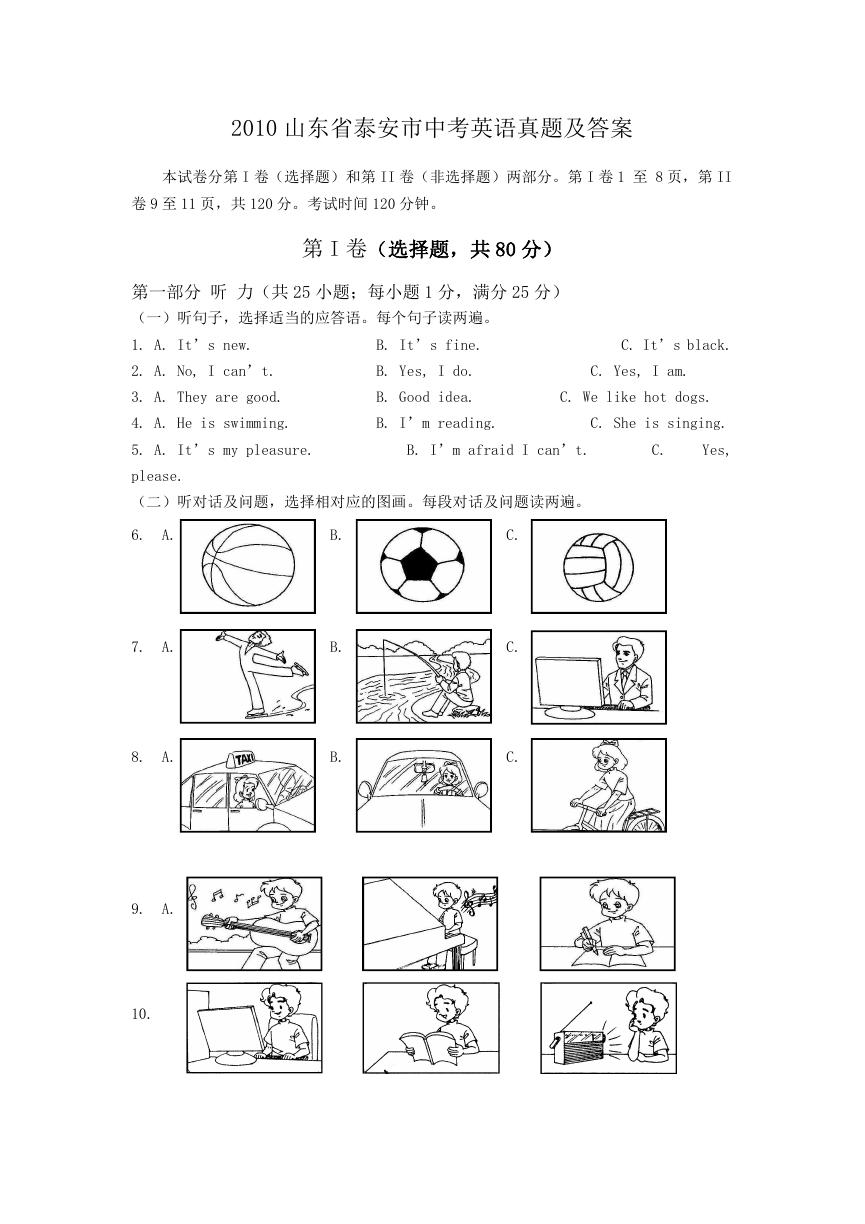
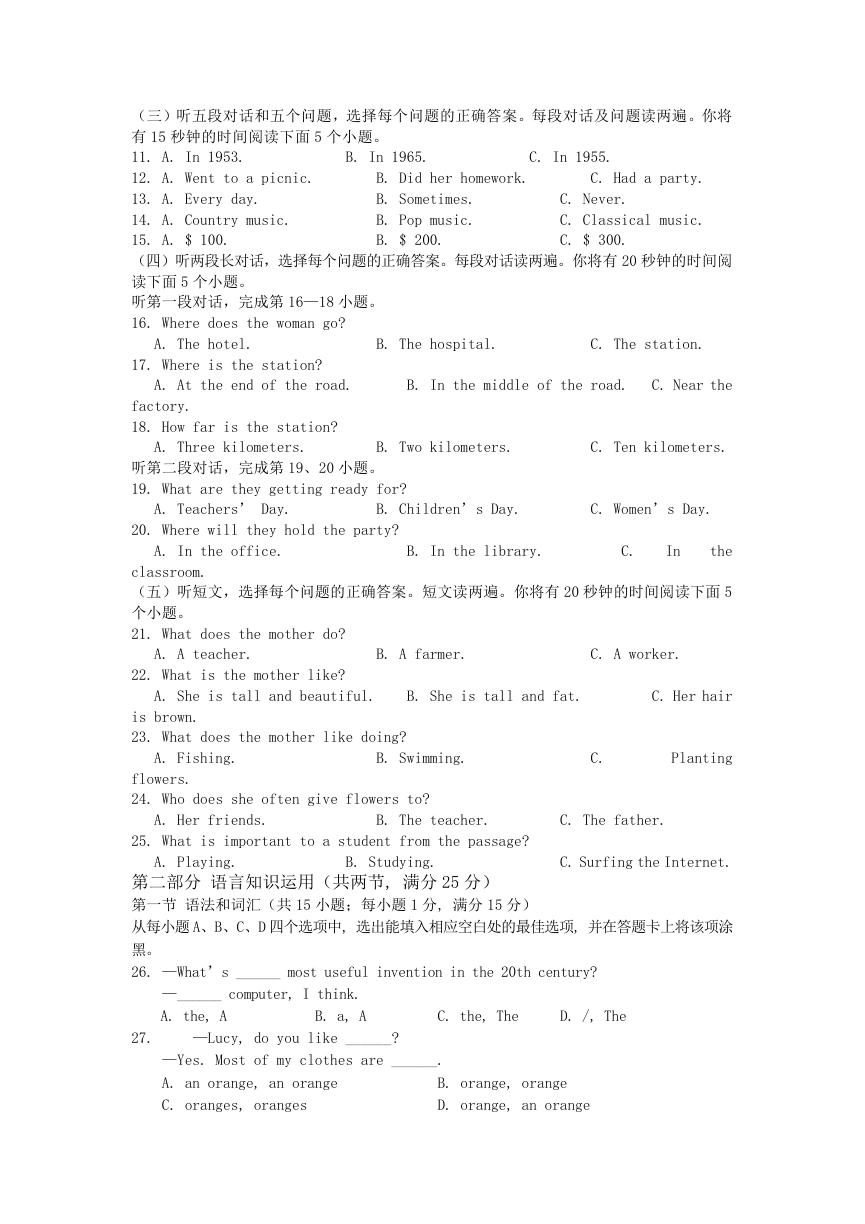
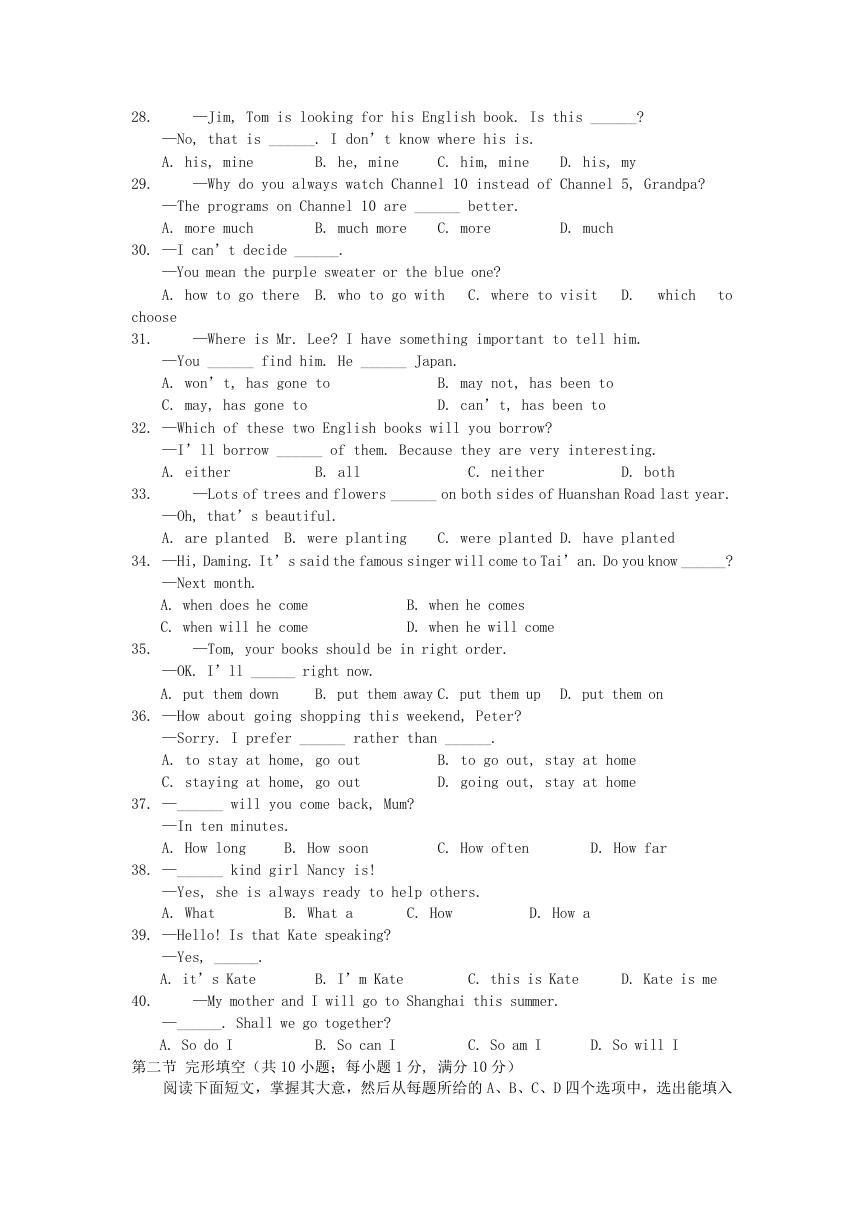
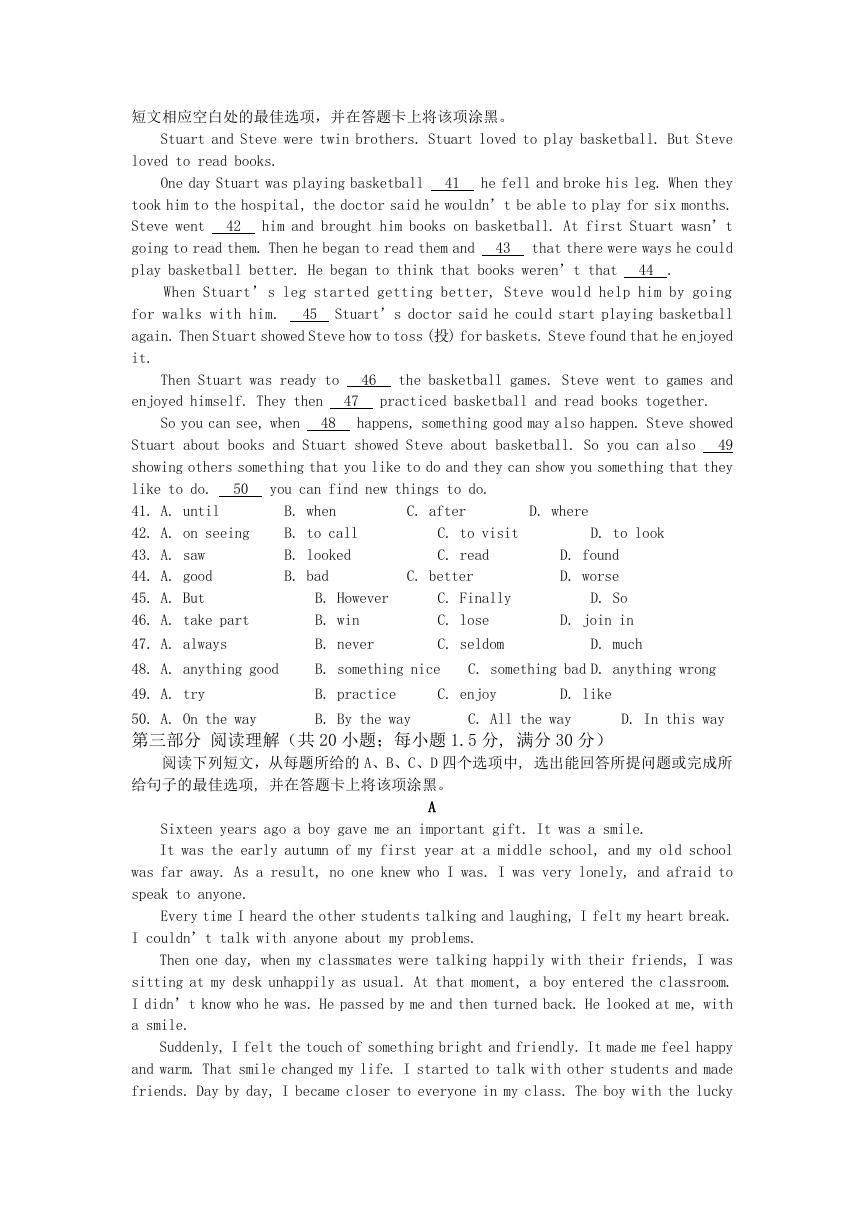
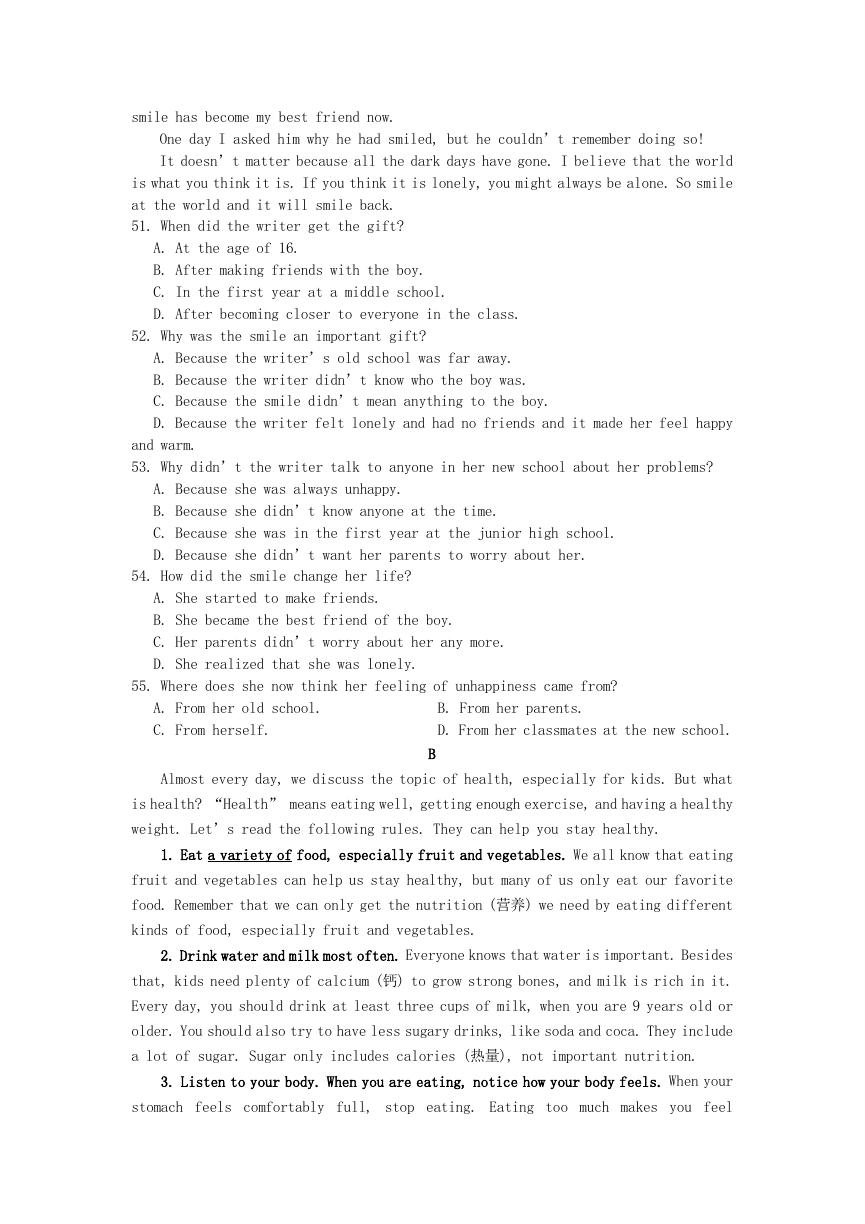
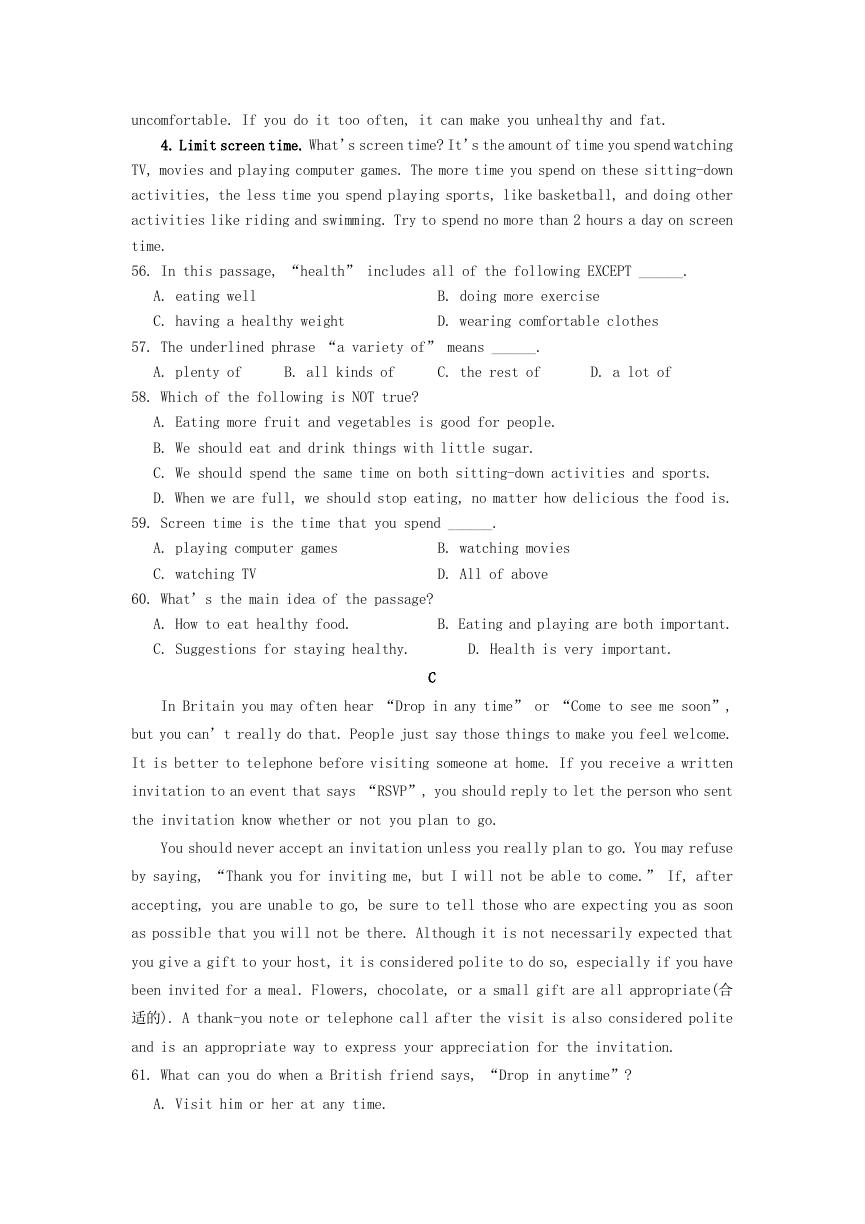
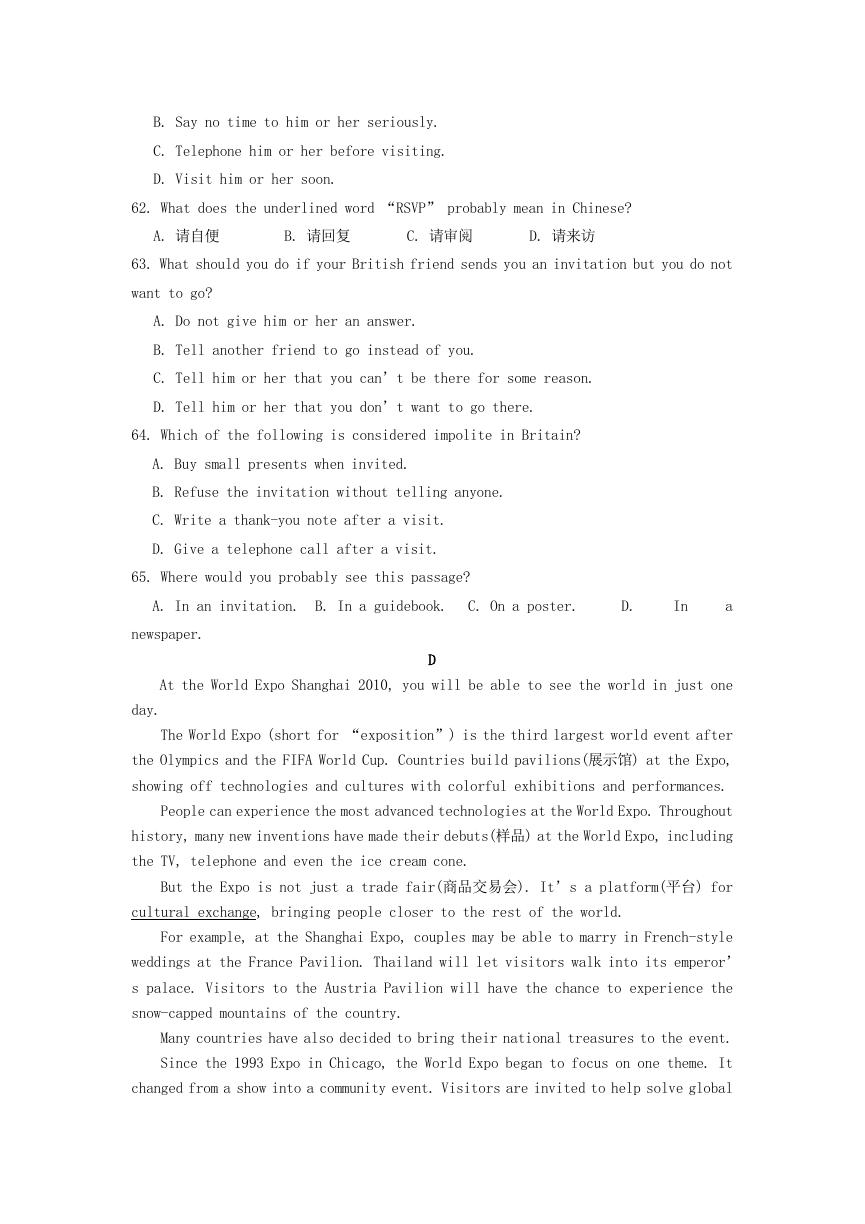
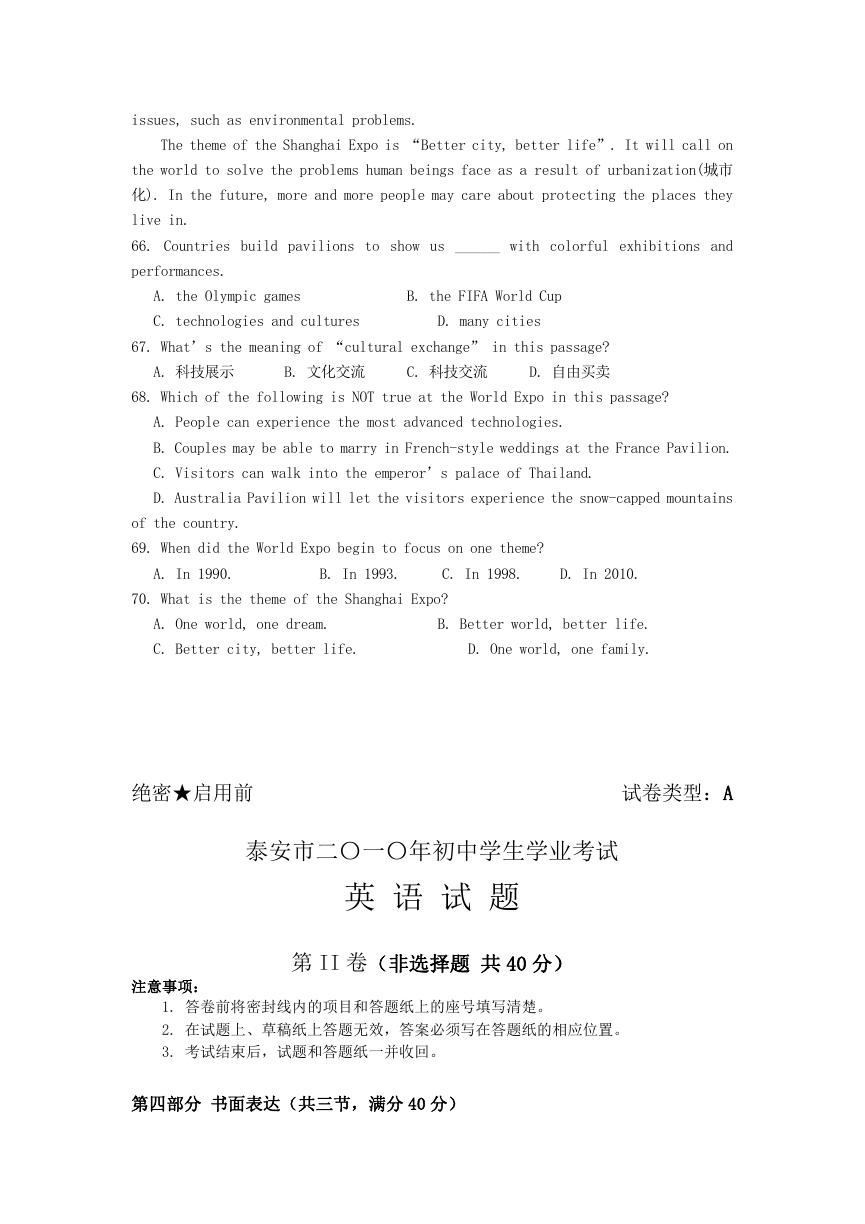








 2023年江西萍乡中考道德与法治真题及答案.doc
2023年江西萍乡中考道德与法治真题及答案.doc 2012年重庆南川中考生物真题及答案.doc
2012年重庆南川中考生物真题及答案.doc 2013年江西师范大学地理学综合及文艺理论基础考研真题.doc
2013年江西师范大学地理学综合及文艺理论基础考研真题.doc 2020年四川甘孜小升初语文真题及答案I卷.doc
2020年四川甘孜小升初语文真题及答案I卷.doc 2020年注册岩土工程师专业基础考试真题及答案.doc
2020年注册岩土工程师专业基础考试真题及答案.doc 2023-2024学年福建省厦门市九年级上学期数学月考试题及答案.doc
2023-2024学年福建省厦门市九年级上学期数学月考试题及答案.doc 2021-2022学年辽宁省沈阳市大东区九年级上学期语文期末试题及答案.doc
2021-2022学年辽宁省沈阳市大东区九年级上学期语文期末试题及答案.doc 2022-2023学年北京东城区初三第一学期物理期末试卷及答案.doc
2022-2023学年北京东城区初三第一学期物理期末试卷及答案.doc 2018上半年江西教师资格初中地理学科知识与教学能力真题及答案.doc
2018上半年江西教师资格初中地理学科知识与教学能力真题及答案.doc 2012年河北国家公务员申论考试真题及答案-省级.doc
2012年河北国家公务员申论考试真题及答案-省级.doc 2020-2021学年江苏省扬州市江都区邵樊片九年级上学期数学第一次质量检测试题及答案.doc
2020-2021学年江苏省扬州市江都区邵樊片九年级上学期数学第一次质量检测试题及答案.doc 2022下半年黑龙江教师资格证中学综合素质真题及答案.doc
2022下半年黑龙江教师资格证中学综合素质真题及答案.doc